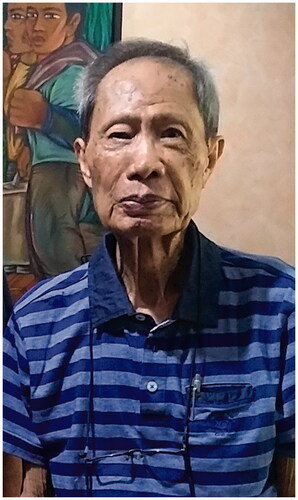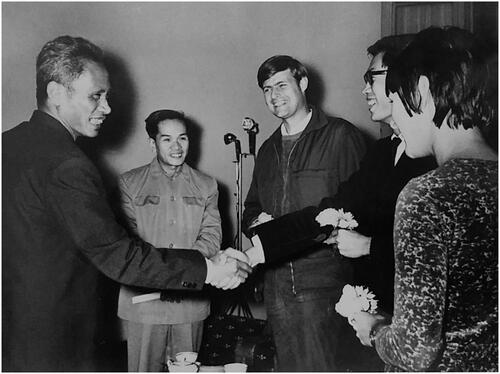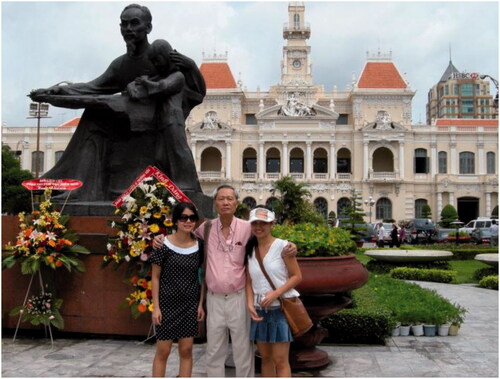When Peter Limqueco stepped down as co-editor of the Journal of Contemporary Asia (JCA) in 2014, we thanked him for his then 44 years of dedicated work for the journal and we looked forward to Peter’s wise advice and editorial direction as he became Editor Emeritus (Hewison Citation2015). Sadly, Peter passed away on July 10, 2022, still sending emails until just a few days before his passing. Peter’s 52-year association with JCA brought it from an idea, through its birth in the Cold War as an alternative to the mainstream journals on Asia, and to become the mature journal it is today ().
I first met Peter in 1981, at JCA’s 12th Anniversary Conference, held at Adelaide University, when he and co-editor Bruce McFarlane invited me, a young doctoral student, to present a paper. Since then, with few exceptions, I have met up with Peter every year, until the COVID-19 pandemic intervened in 2020. As Peter’s age no longer let him make trips to the restaurants of Ermita, the meetings were in Quezon City’s restaurants and at his home as we discussed the journal, politics, and much more. Those meetings will be greatly missed, not least because Peter provided an important link with JCA’s origins and ideology.
When JCA was established in 1970, Peter was a driving force. With Malcolm Caldwell, Peter assembled an Editorial Board that included many leading scholars who opposed the wars being waged in Southeast Asia. Peter and Malcolm established the linkages that produced the documents that were a feature of the journal in its early years, with announcements from social and political movements that waged domestic struggles and opposed Western imperialism. Some of these political struggles also jostled the Editorial Board from time to time, and it was Peter and Bruce McFarlane who held things together and established academic standards and maintained an openness to various progressive trends (Hewison Citation2020, 7). From the beginning, JCA has sought to publish material by and for progressive scholars.
Peter was born in Manila in 1939 and was schooled there before undertaking undergraduate studies at the University of the Philippines. This was followed by postgraduate studies in Sweden at the University of Stockholm and Uppsala University.
When JCA’s first issue was launched in 1970, its founders described it as a “scholarly journal … financed by individual contributions and refuses to accept support from any Government, Corporation, Cold War Institution or Foundation.” In that first issue, Peter was listed as a member of the Provisional Editorial Board and a representative of the Bertrand Russell Peace Foundation in Sweden. He was also said to have “recently visited the liberated areas of Laos,” with one result of that being his interview with Prince Souphanouvong, then President of the Central Committee of the Lao Patriotic Front (Limqueco Citation1970). Peter also provided the Swedish business address for JCA.
Peter’s relationship with the Bertrand Russell Peace Foundation and the Tribunal, also known as the Russell Tribunal, on the US war in Vietnam, Laos, and Cambodia was critical in shaping JCA in its early days. So was Malcolm Caldwell’s chairing of the Campaign for Nuclear Disarmament, where Russell had been a founder and CND’s first and only president (McMaster University Citationn.d). With Lord Russell as the International War Crimes Tribunal’s Honorary President and Jean-Paul Sartre as Executive President, the Tribunal held three sessions in 1967, in Stockholm, Tokyo, and Roskilde, Denmark (Mehta Citation2012, 85). With playwright, novelist, and film director Peter Weiss and political activist Ken Coates, Peter edited Prevent the Crime of Silence (Citation1971), a book about the Tribunal that drew on its reports and the evidence provided by academics, philosophers, journalists, lawyers, jurists, scientists, and activists. Noam Chomsky wrote a foreword for the book. Both Weiss and Chomsky became members of the JCA Editorial Board and the Bertrand Russell Peace Foundation’s Spokesman Books printed the journal for many years, while Stockholm provided an important link to the liberation movements in Vietnam and Laos.
Peter visited Vietnam () and Pathet Lao areas in Laos several times as an activist, journalist, and documentary filmmaker. His films with Ingrid Dahlberg and Lars Hjelm for Swedish Television were path-breaking. Those visits also produced documents and interviews for JCA (Limqueco Citation1976a, Citation1976b, Citation1977a, Citation1978). Peter’s Philippines contacts were not neglected, with Francisco Nemenzo Jr. joining the Editorial Board and the first issue featuring Renato Constantino’s (Citation1970) now classic essay “The Mis-education of the Filipino.”
Peter published several articles for JCA including: an important interview with Thailand’s exiled former Prime Minister Pridi Phanomyong (Limqueco Citation1977b); on economic planning and socialism (Limqueco and McFarlane Citation1979); a critical assessment of development in the region (Limqueco Citation1983); and a tribute to Constantino (Limqueco Citation2000). Peter’s partnership with co-editor Bruce McFarlane also produced an account of regionalism (Limqueco and McFarlane Citation1980) and several books from the Journal of Contemporary Asia Publishers and other publishers, Industrialization and the Labour Process in Thailand (Odhnoff, McFarlane, and Limqueco Citation1983), Neo-Marxist Theories of Development (Limqueco and McFarlane Citation1983), and Labour and Industry in ASEAN (Limqueco, McFarlane, and Odhnoff Citation1990).
Behind the scenes, Peter’s hard work and determination played a major role in securing the viability of the journal. He managed every aspect of the journal from its sometimes challenging internal politics to the receipt of mailed articles and reviews, and overseeing production, printing, and distribution. He did this while working as a journalist in Stockholm and then in Bangkok (for an early incarnation of the Asia Times). When he returned to live in Manila, JCA’s whole operation also moved there. Through all of this, maintaining the independence of the journal remained a central concern while day-to-day matters revolved around the small JCA office and its efforts to get the journal printed, bound, and posted out to subscribers. This continued for several years, but as the journal grew and online operations became more important, in 2007 the co-editors decided to move production to Routledge, while retaining editorial control (see Limqueco and Hewison Citation2010; Hewison Citation2020).
As many academics and comrades know, Peter always encouraged his colleagues. As Editorial Board member Jane Hutchison recalled: “[Peter] was incredibly kind to me and I loved our conversations over a beer in his house; Peter told great stories …”. She added that it was Peter’s introduction that led her “to talk to a local garment union official. The conversation with her set the foundations for my PhD thesis.”
Peter’s encouragement of young scholars and his welcoming of visitors was legendary, usually over a beer, a good wine, some whiskey, and an excellent meal. One of those he mentored was Frances Mae Ramos (Mae) who fondly remembers Peter’s support for her and her sister from when they were very young and hung out at the JCA office where their mother worked. Peter was, she says, a “gourmand, and above all, a beer intellectual. He introduced us to the virtues of good alcohol (Carlsberg was his preferred brand until the restaurants in Manila went local with their selections), and of the delectations of world cuisines.”
Peter’s visits to Vietnam continued long after reunification and almost as long as his weekly tennis matches in Manila, but age and ill-health caught up with him on both counts. On my last visit to Ho Chi Minh City with Peter, journal business began with a long breakfast, transferred to a nearby French restaurant for lunch, and following a siesta, a beer and dinner. As Mae explains, Peter “loved Vietnam, a country that I thought could not go wrong in his eyes with its food, culture, and political life” ().
For Mae and her sister, Peter was “Chief, a Filipino informal address. It was perhaps a way for us to test his Filipino side.” For them, Peter was a cosmopolitan citizen of the world: “He had spent most of his prime in Sweden where, according to him, Prime Ministers drank beer in pubs with little fuss and no security detail, cars never honked, and ostentation was frowned upon. To a young Filipino girl who had never been to Sweden, this description spoke more of what the Philippines was not … In a sense, he gave us a glimpse of the world through the way he lived and the books he encouraged us to read.” Friends recall Peter’s lament about the Philippines: “Nothing works in this country!” It was a criticism, but his fondness for Manila and the Philippines was clear.
Peter will be greatly missed by JCA and its associated intellectual community. When learning of Peter’s passing, Noam Chomsky put it simply: Peter was, he said, “a really good person.” He was indeed, and we thank Peter for all he did for us.
Editor-in-chief
References
- Constantino, R. 1970. “The Mis-Education of the Filipino.” Journal of Contemporary Asia 1 (1): 20–36.
- Hewison, K. 2015. “An Appreciation: Peter Limqueco.” Journal of Contemporary Asia 45 (1): 1–2.
- Hewison, K. 2020. “50 Years of the Journal of Contemporary Asia.” Journal of Contemporary Asia 50 (1): 5–13.
- Limqueco, P. 1970. “Interview with Prince Souphanouvong: President of the Central Committee of the Lao Patriotic Front.” Journal of Contemporary Asia 1 (1): 65–68.
- Limqueco, P. 1976a. “President Souphanouvong of the People’s Democratic Republic of Laos Answers Questions from Peter Limqueco, January 16, 1976.” Journal of Contemporary Asia 6 (1): 108–110.
- Limqueco, P. 1976b. “Notes on a Visit to Vietnam.” Journal of Contemporary Asia 6 (4): 405–423.
- Limqueco, P. 1977a. “Interview with Nguyen Khac Vien.” Journal of Contemporary Asia 7 (2): 213–219.
- Limqueco, P. 1977b. “Interview with Pridi Banomyong.” Journal of Contemporary Asia 7 (3): 332–337.
- Limqueco, P. 1978. “Interview with Nguyen Khac Vien by Peter Limqueco.” Journal of Contemporary Asia 8 (4): 575–578.
- Limqueco, P. 1983. “Contradictions of Development in ASEAN.” Journal of Contemporary Asia 13 (3): 283–302.
- Limqueco, P. 2000. “The Partisan Scholar.” Journal of Contemporary Asia, 30 (3): 291–297.
- Limqueco, P., and K. Hewison. 2010. “Editorial: Forty Years of the Journal of Contemporary Asia.” Journal of Contemporary Asia 40 (4): 537–538.
- Limqueco, P., and B. McFarlane. 1979. “Problems of Economic Planning for Underdeveloped Socialist Countries.” Journal of Contemporary Asia 9 (1): 5–26.
- Limqueco, P., and B. McFarlane. 1980. “UNITAR Conference 1980: Step Towards Collective Self-reliance in Asia.” Journal of Contemporary Asia 10 (4): 470–477.
- Limqueco, P., and B. McFarlane. 1983. Neo-Marxist Theories of Development. London: Croom Helm.
- Limqueco, P., B. McFarlane, and J. Odhnoff. 1990. Labour and Industry in ASEAN. Manila: Journal of Contemporary Asia Publishers.
- Limqueco, P., P. Weiss, and K. Coates. 1971. Prevent the Crime of Silence. London: Allen Lane.
- McMaster University. n.d. “Fused, Fizzing, and Ready to Go Off: Bertrand Russell Takes to the Streets.” Russell Library, McMaster University Library. Accessed August 9, 2022. https://digitalcollections.mcmaster.ca/pw20c/case-study/fused-fizzing-and-ready-go-bertrand-russell-takes-streets.
- Mehta, H. 2012. “North Vietnam’s Informal Diplomacy with Bertrand Russell: Peace Activism and the International War Crimes Tribunal.” Peace & Change 37 (1): 64–94.
- Odhnoff, J., B. McFarlane, and P. Limqueco. 1983. Industrialization and the Labour Process in Thailand. Manila: Journal of Contemporary Asia Publishers.



